- Home
- James Luceno
Star Wars: Cloak of Deception Page 10
Star Wars: Cloak of Deception Read online
Page 10
Rejoinders flew fast and furious from all sides of the chamber—from the Wookiee delegation, the Sullustans, the Bimms, and Bothans. Valorum attempted to quote the rules, but many of the senators had had enough of the rules, and shouted him down.
“The Trade Federation will seek to offset the taxes by charging more for their services,” the Bothan delegate argued. “The outlying systems will, in turn, be forced to assume the burden of taxation.”
Palpatine saw what was coming and quickly dispatched black-cloaked Sate Pestage to deliver a handwritten note to the sergeant-at-arms, who relayed the note to the Supreme Chancellor. Valorum received the message a moment after the Bothan delegate had demanded to know how the credits garnered from taxation would be allocated.
Lifting his eyes from the note, Valorum glanced at the Naboo balcony before responding. “I propose that a percentage of the revenues garnered through taxation be allocated for relief and development of the outlying systems.”
Cheers roared from most of the upper-tier balconies, and many of the senators in the platforms there came to their feet to applaud. Closer to the floor, encouragement came from Wookiee Senator Yarua, Tendau Bendon of Ithor, and Horox Ryyder, who represented thousands of worlds in the Raioballo sector.
Palpatine made a mental note of the naysayers, including Toonbuck Toora, Po Nudo, Wat Tambor, and other delegates. Then he detached the platform and dropped for the center of the rotunda, chased by two hovercams.
“We recognize the senator from the sovereign system of Naboo,” Valorum said.
“Supreme Chancellor,” Palpatine said, “may I suggest that, while many important points have been made, these issues are far from resolved, and should perhaps be explored in greater depth in a different forum, after everyone has had an opportunity to reflect on what has been said.”
Valorum appeared confused for a moment. “What sort of forum, Senator Palpatine?”
“Before the motion goes to committee, I propose that a summit be held, where delegates from the Trade Federation and its signatory members can meet openly to offer their solutions to these … ‘sobering challenges,’ as you say.”
The same senators who had cheered Valorum, now applauded Palpatine.
Uncertainty and perhaps vague misgiving drained some of the color from Valorum’s face. “Do you have some specific location in mind, Senator?” he asked.
Palpatine considered it. “May I suggest … Eriadu?”
A platform joined Palpatine’s at the center of the rotunda. The delegation’s dark-complexioned human members wore loose-fitting garments and cloth turbans.
“Supreme Chancellor,” their spokesman said, “Eriadu would be honored to host such a summit.”
Senator Toora seconded the motion and moved to enact a moratorium on the taxation proposal.
Valorum had no choice but to comply.
“I will confer with all relevant parties and set a date for the summit,” he said when the furor had abated. “With regard to taxation of the outlying trade routes, there will be a moratorium on the voting process until the summit concludes and all viewpoints have been expressed. Furthermore, as a sign of the senate’s commitment to foster peace and stability, I shall attend the summit personally.”
Many in the rotunda rose and applauded.
Valorum’s gaze found Palpatine and lingered on him for a moment. Palpatine smiled and nodded conspiratorially.
Sporting jagged wounds it hadn’t had when it had first appeared over Dorvalla, or later, when it had settled down to retrieve Cohl and what was left of his team, the Hawk-Bat floated in space, gravitationally anchored to a buff-colored world of arid mountain ranges and ice-blue seas. Five CloakShape starfighters surrounded her, with a sixth nuzzled up to the gunship’s starboard airlock. Far beyond the ships spread a band of space mines, made to resemble asteroids.
On the Hawk-Bat’s side of the airlock, Cohl waited vigilantly for his visitors to board. His bare arms were lacerated from the razor ferns he had been forced to forge through on Dorvalla, and his dark face, with its eye mask of diamond-shaped tattoos, was bruised black and blue beneath his beard. Adding severity to features many thought ferocious to begin with, his coiled hair framed his countenance like the hood of a serpent.
The airlock’s indicator light flashed.
“Do you want me to disappear?” Rella asked from behind him.
She was in even worse shape than Cohl. Her left eye was concealed by a bacta patch and her left forearm wore a plascast. Boiny remained in a bacta tank.
Cohl shook his head without taking his gaze from the airlock. “Stick around. Keep your blaster handy.”
Rella drew the weapon from the holster on her right hip and checked the charge.
The airlock hissed opened, and a slim human and a reptilian humanoid stepped into the corridor, dressed alike in caftans, coarsely woven trousers, and knee-high boots. The latter had tough, corrugated skin, iridescent in sunlight, and hands the size of scoopball mitts. His flat face had multiple nostrils, and four small horns protruded from his forehead. From his left hand dangled a sizable carrycase.
“Welcome to Asmeru, Captain Cohl,” the human said in Basic. “It’s good to see you alive and comparatively well.”
Cohl nodded curtly in greeting. “Havac.”
Havac motioned to his hulking partner. “You remember Cindar.”
Cohl nodded again. Neither he nor the Hawk-Bat’s scanners saw signs of concealed weapons on the pair.
“Rella,” he said, motioning to her by way of introduction.
Havac smiled and extended his hand to her in a courtly gesture. “How could I forget?”
“Let’s go forward, where we can talk,” Cohl said.
He appraised his guests as they walked. Havac wasn’t the human’s real name, but rather his combat name. A former holo-documentarian, Havac had been an alien-rights activist during the Stark Hyperspace Conflict and had spent the past several years chronicling the various abuses of the Trade Federation. In fact, he had no stomach for violence, but he was sharp and had a talent for treachery.
He and Cindar weren’t characteristic of the thousands of human and nonhuman members of the Nebula Front. But they were standard issue in the organization’s burgeoning militant wing. Now headquartered on the arid planet below, the Front had recruited from worlds up and down the Rimma Trade Route, from Sullust to Sluis Van, but only the Ancient Houses that ruled the Senex sector had granted them a base of operations.
“Where’s the rest of your crew, Captain?” Havac asked over his shoulder.
The question hit Cohl like a just-remembered nightmare. It was the same question he had asked the commander of the Revenue days earlier, when Cohl’s team had numbered twelve.
“You might say that a lot of them never left Dorvalla space,” he said finally.
It took Havac a moment to grasp Cohl’s meaning, then he frowned in sympathy. “I’m sorry to hear that, Captain. We thought we’d lost you, as well.”
Cohl shook his head. “Not a chance.”
“Half the Rim is talking about what happened at Dorvalla. We really weren’t expecting you to obliterate the Revenue.”
“I don’t like to waste time—especially when I’m dealing with Neimoidians,” Cohl said. “They’d sooner sacrifice themselves than their cargo. Fortunately, the Revenue’s commander was more cowardly than most of them. As for destroying the freighter, you can consider that a gift.”
The four of them entered the main forward cabin and seated themselves around a circular table. Cindar placed the carrycase at the center of the table.
“I have to hand it to you, Captain,” Havac said, “you’ve got the Trade Federation running scared. They’ve even solicited help from Coruscant.”
Cohl shrugged. “No harm in trying.”
Havac leaned forward with a certain eagerness. “You have the aurodium?”
Cohl glanced at Rella, who unclipped a remote from her belt and keyed a short code. A small repulsorsled beari
ng a lockbox lifted off the deck nearby and floated toward the table. Rella entered another code and the lid of the box opened, its contents of ingots spilling rainbow light into the cabin.
Havac’s and Cindar’s eyes widened.
“I can’t tell you what this will mean to us,” Havac said.
But a hint of suspicion had crept into his partner’s gaze. “It’s all here?” Cindar asked.
Cohl’s neutral look became a glare. “What are you asking me?”
The humanoid shrugged. “Just wondering if any of it happened to get misplaced along the way.”
Abruptly, Cohl reached across the table, grabbing Cindar by the front of his caftan and yanking him forward. “That treasure is bloodied. Good people died bringing it to you.” He pushed Cindar back into his seat. “You’d better put it to good use.”
“Stop this, please,” Havac said.
Cohl glowered. “You don’t like violence—except on your orders, is that it?”
Havac studied his hands, then lifted his eyes. “Rest assured that the aurodium will be put to good use, Captain.”
Cindar smoothed the front of his garment, but was otherwise unruffled by Cohl’s fury. He slid the carrycase forward. Cohl removed it from the tabletop and set it down on the deck.
Cindar watched him for a moment, then said, “Aren’t you going to ask if it’s all there?”
Cohl stared at him. “Let me put it this way. For every credit it’s short, I’ll take a kilo of meat from you.”
“So, I’d be a fool,” Cindar said with a grin.
Cohl nodded. “You’d be a fool.”
Rella handed the remote to Havac, and Cindar closed the lid on the lockbox.
“Where’s the aurodium going?” Cohl asked mildly.
Havac looked surprised. “Captain, did I ask what you’re planning to do with your payment?”
Cohl smiled. “Fair enough.”
Following the exchange, Rella turned to Cohl. “I’m sure he plans to donate it to his favorite charity.”
Havac laughed. “You’re not far off the mark.”
“Here’s another bonus for you, Havac,” Cohl said. “We had some unexpected trouble at Dorvalla. Someone infiltrated the Revenue using the same technique we used. They hid a ship inside a cargo pod, just like we did. They tracked us when we left the freighter and came close to ruining what I thought was a secure plan. Their ship turned out to be a Judicial Department Lancet.”
Havac and Cindar traded surprised looks. “Judicials?” Havac said. “At Dorvalla, of all places?”
Cohl watched them carefully. “Actually, I think they were Jedi.”
Havac’s incredulity increased. “Why do you think that?”
“Call it a hunch. The point is, no one was supposed to know about that operation.”
Havac sat back in his seat, perplexed. “Now it’s my turn to wonder, Captain. What are you asking me?”
“Who else in the Nebula Front knew about the operation?”
Cindar snorted in derision. “Think it through, Cohl. Why would any of us sabotage our own campaign?”
“That’s what I’m asking,” Cohl said. “It could be that not everyone down below agrees with your methods—your hiring us, for example. Someone could have been trying to sabotage you, not me.”
Havac nodded. “Thank you, Captain. I’ll bear that in mind.” He paused briefly, then said, “What’s next for you two?”
“We thought we’d retire from mayhem,” Rella said, taking hold of Cohl’s left hand at the same time. “Maybe take up moisture farming.”
Havac grinned. “I can see that. The two of you on Tatooine or somewhere, living among banthas and dew-backs. It’s just your style.”
“Why the curiosity?” Cohl said.
Havac’s grin straightened. “We may have something big in the works. Something perfectly suited to your talents.” He glanced at Rella, then back at Cohl. “It would pay enough to guarantee your retirement.”
Rella shot Cohl a warning look. “Don’t listen to him, Cohl. Let someone else hire out to the Nebula Front.” She cut her eyes to Havac. “Besides, we plan to retire in high style.”
“You want to retire rich?” Cindar said. “Buy a Neimoidian for what he’s worth, then sell him for what he thinks he’s worth.”
“The job I have in mind would allow you to retire in high style,” Havac baited.
“Cohl,” Rella said, “are you going to tell these guys to take a hike back to their own ship, or do I have to do it?”
Cohl let go of her hand and tugged at his beard. “It can’t hurt to hear them out.”
“Yes, it can, Cohl, yes, it can.”
He looked at her, then laughed shortly. “Rella’s right,” he told Havac. “We’re not interested.”
Havac heaved his shoulders and stood up, extending his hand to Cohl. “Come and see us if you have a change of heart.”
Much closer to the Core, the Acquisitor had returned home. Sullen Neimoidia rotated slowly beneath the ring-shaped freighter. As was the case in the far-off Senex system, meetings of a sinister sort were under way; discussions centered around weapons and strategy, destruction and death. But the ships that had brought the Acquisitor’s guests had had no need to sidle up to airlocks. Not when the hangar arms themselves were commodious enough to conceal an invasion army.
In zone two of the port arm, balanced atop his claw-footed mechno-chair, sat Viceroy Nute Gunray, in rich burgundy robes and triple-crested tiara. Off to Gunray’s right stood legal counsel Rune Haako and Deputy Viceroy Hath Monchar; and to Gunray’s left, the Acquisitor’s new commander, smallish Daultay Dofine, fresh from the debacle at Dorvalla and still bewildered by his unexpected promotion.
In the center of the hangar floor hunkered a double-winged behemoth, which bore a vague resemblance to Neimoidia’s gauzy-winged needle fliers. Ponderously exiting the wide-open jaws of the behemoth’s foot ramp rode thickly armored, russet-colored vehicles that might have been modeled on charging banthas—backs humped in anger, huffing clouds of hot exhaust, laser cannons extended like tusks. And behind those came droid-operated repulsorlift tanks, with shovel-shaped prows and top-mounted gun turrets.
Prototype war machines, the gargantuan landing craft, the monstrous multitroop transports, and the sleekly styled tanks had been designed and built by Haor Chall Engineering and Baktoid Armor, whose alien representatives were standing in full view of Gunray and beaming with pride.
To Haor Chall, especially, design perfection amounted to a religious edict.
“Behold, Viceroy,” Haor Chall’s insectoid representative said, gesturing with all four arms to the closest transport, whose circular deployment hatch, hinged at the top, was just swinging open.
Gunray watched in amazement as a rack telescoped from the hatch and dozens of battle droids unfolded themselves before his eyes.
“And this, Viceroy,” Baktoid’s winged representative added.
Gunray’s red eyes moved back to the landing craft in time to see a dozen airhooks soar toward the upper reaches of the hangar arm. Blade-thin vehicles with twin foot-rests and top-mounted blasters, all were piloted by droids, whose backward leaning postures made them appear to be hanging on to the slender handlebars for dear life.
Gunray was speechless.
While he had never seen their like, in each of the prototypes he recognized elements of the very machines the Trade Federation had employed for centuries in transporting natural resources and other commodities. In the fuselage of the double-winged landing craft, for example, he recognized the Federation’s narrow ore barge. But Haor Chall had set the fuselage on a pedestal and capped it with two enormous wings, presumably kept from sagging by powerful tensor fields.
Despite the animistic look Baktoid had imparted to the troop transports, Gunray recognized the Trade Federation’s own repulsorlift cargo pod, built on an even more gargantuan scale. As for the folding battle droids and the Single Trooper Aerial Platforms, they were simply variations of Baktoid�
�s security droids, and Longspur and Alloi’s Bespin airhooks.
But one thing was clear: everything he was being shown spoke less to spaceborne defense than to groundside deployment. The realization was more than Gunray could absorb; more than he wished to absorb.
“As you have probably observed, Viceroy,” Haor Chall’s representative was saying, “the Trade Federation already has most of the raw materials needed to create your army.” He motioned to the representative from Baktoid. “In partnership with Baktoid, we can convert your security and worker droids to battle models, and your barges and cargo pods to landing craft.”
“More units, less money,” the Baktoid representative added.
“Best of all, since the components of the landing crafts can be stored in various places—wings, fuselages, and pedestals—they can be assembled at a moment’s notice. You could place one landing craft in each of a hundred freighters, or a hundred landing craft in but one of your freighters—for singularly thorny circumstances. Either way, none who come aboard to inspect your freighters will comprehend what they are seeing. As our mutual friend says, you will have an army without giving the appearance of having an army.”
“Mutual friend,” Rune Haako muttered, just loudly enough for Gunray to hear. “When Darth Sidious says do this, it is performed.”
“We enjoy dealing with Neimoidians,” Baktoid’s representative stepped forward to say, “because of the enthusiasm and awe you demonstrate for our creations. Therefore, we have other weapons in mind for you: starfighters that will no longer have to rely on droid pilots, but will themselves answer to a central control computer.
“You may even wish to contact the Colicoids of Colla IV, who are rumored to have developed a combat droid capable of rolling to its destinations.” The alien gestured broadly to the immense hangar. “Perfect for covering the vast distances inside your freighters, and defending against boarding parties.”
Gunray heard Dofine swallow audibly, but, once more, it was Haako who spoke.

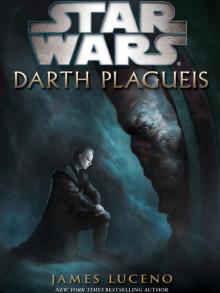 Darth Plagueis
Darth Plagueis Memories End
Memories End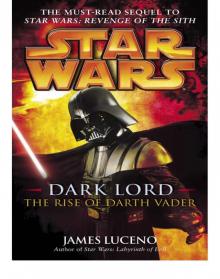 Star Wars: Dark Lord: The Rise of Darth Vader
Star Wars: Dark Lord: The Rise of Darth Vader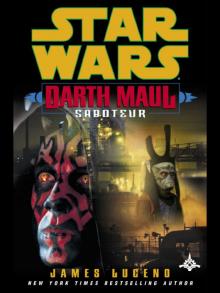 Star Wars Darth Maul: Saboteur
Star Wars Darth Maul: Saboteur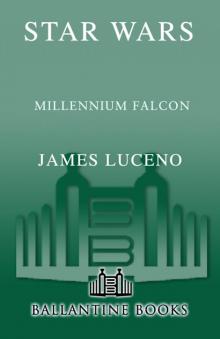 Star Wars: Millennium Falcon
Star Wars: Millennium Falcon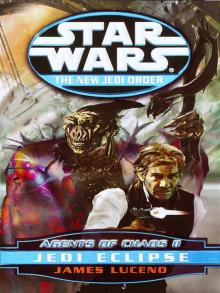 Jedi Eclipse
Jedi Eclipse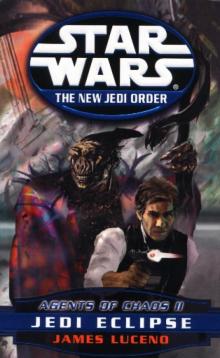 Star Wars The New Jedi Order - Agents of Chaos II - Jedi Eclipse - Book 5
Star Wars The New Jedi Order - Agents of Chaos II - Jedi Eclipse - Book 5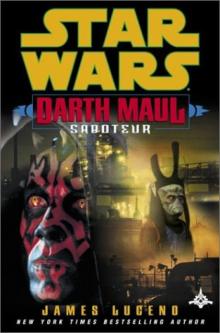 Star Wars - Darth Maul - Saboteur
Star Wars - Darth Maul - Saboteur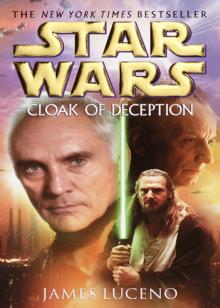 Star Wars: Cloak of Deception
Star Wars: Cloak of Deception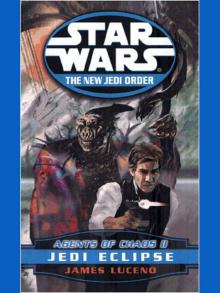 Star Wars: New Jedi Order: Agents of Chaos II: Jedi Eclipse
Star Wars: New Jedi Order: Agents of Chaos II: Jedi Eclipse End Game
End Game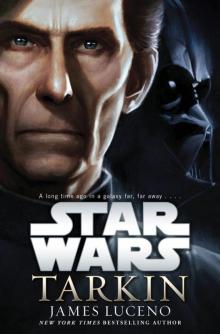 Tarkin: Star Wars
Tarkin: Star Wars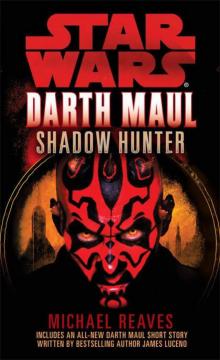 Restraint
Restraint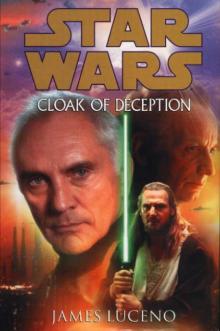 Star Wars - Cloak Of Deception
Star Wars - Cloak Of Deception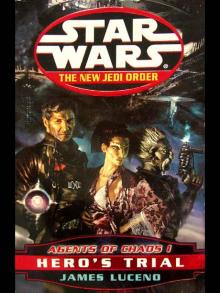 Star Wars: New Jedi Order: Agents of Chaos I: Hero's Trial
Star Wars: New Jedi Order: Agents of Chaos I: Hero's Trial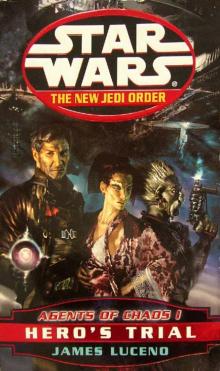 Star Wars The New Jedi Order - Hero's Trial - Book 4
Star Wars The New Jedi Order - Hero's Trial - Book 4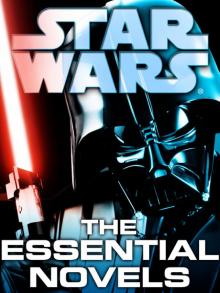 The Essential Novels
The Essential Novels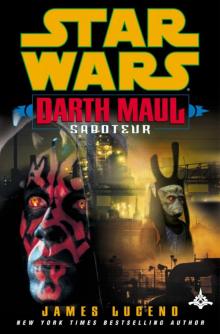 Darth Maul: Saboteur
Darth Maul: Saboteur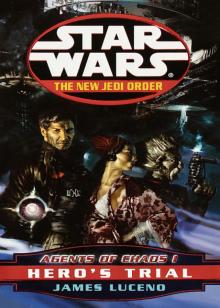 Hero's Trial: Agents of Chaos I
Hero's Trial: Agents of Chaos I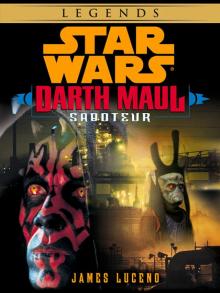 Saboteur
Saboteur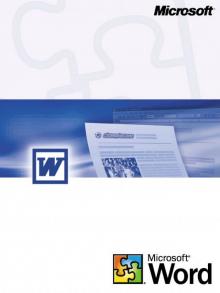 The Unifying Force
The Unifying Force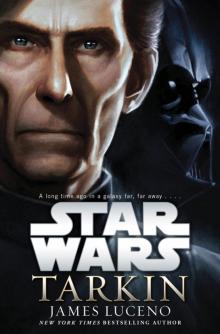 Tarkin
Tarkin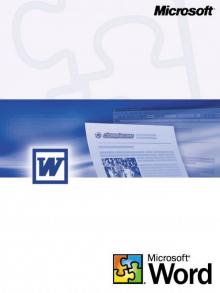 Dark Lord : The Rise of Darth Vader
Dark Lord : The Rise of Darth Vader Catalyst
Catalyst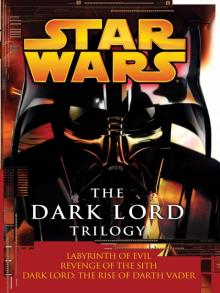 Book 0 - The Dark Lord Trilogy
Book 0 - The Dark Lord Trilogy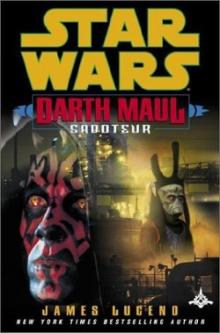 Darth Maul: Saboteur (star wars)
Darth Maul: Saboteur (star wars)